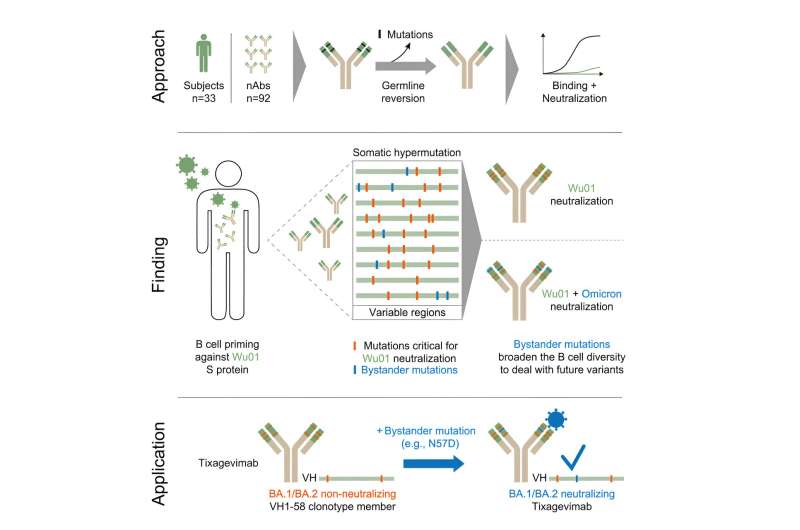This article has been reviewed according to Science X's editorial process and policies. Editors have highlighted the following attributes while ensuring the content's credibility:
fact-checked
peer-reviewed publication
trusted source
proofread
How first contact influences the immune response to new SARS-CoV-2 variants

Although SARS-CoV-2 is no longer a stranger to the immune system, new virus variants still pose a challenge. The working group led by Professor Dr. Florian Klein, Director of the Institute of Virology at the University Hospital Cologne and the Faculty of Medicine, has now published two studies investigating how the antibody response to SARS-CoV-2 changes over time and how the immune system is preparing itself for new variants with clever strategies.
The first paper, titled "Enhanced SARS-CoV-2 humoral immunity following breakthrough infection builds upon the preexisting memory B cell pool," is published in Science Immunology. The second paper, titled "Somatic hypermutation introduces bystander mutations that prepare SARS-CoV-2 antibodies for emerging variants" is published in Immunity.
In a process known as affinity maturation, antibodies can mature over time through the exchange (mutations) of individual amino acids, thus enabling them to better detect infectious pathogens. The working group led by Professor Klein has now been able to show that an omicron infection induces a renewed immune response in vaccinated persons, which is primarily based on the reactivation of so-called memory B cells.
Interestingly, the maturation process of the antibodies produced by these cells had already taken place long before omicron emerged—so the immune system was already prepared. The results of the two studies show how strongly the first contact with SARS-CoV-2 influences the immune system and indicate the possibility that it is also prepared for future variants.
"Our first goal was to investigate how the antibody response in healthy subjects changes through a third vaccination against the original SARS-CoV-2 strain," reports Svea Rose, a doctoral candidate and a first author.
"We were initially surprised by the results. Although the third vaccination significantly increased the SARS-CoV-2 immune response overall, there was hardly any further maturation at the level of individual antibodies."
However, people who—like many—became infected with the omicron variants BA.1 and BA.2 after vaccination were also examined. The re-analysis showed that memory B cells which were able to form antibodies neutralizing SARS-CoV-2 omicron, now proliferate.
"Interestingly, the immune cells directed against the omicron variant were already present before contact with omicron and were not induced by micron," adds first author Dr. Timm Weber. But that's not all: At an early stage, the researchers found so-called broad neutralizing antibodies that can neutralize all new variants that have been tested.
At the same time, the working group looked at the molecular mechanism of affinity maturation. The clock was turned back, and individual antibodies, which were isolated throughout the world in the first year of the pandemic, were restored to their original state, report the two lead authors Michael Korenkov and Dr. Matthias Zehner in the study published in Immunity.
As a result, the researchers were able to show that some of the modifications during affinity maturation are not deliberate but happen randomly. Surprisingly, it was precisely these random modifications that were essential for the neutralization of omicron variants.
"The immune system expands the arsenal of existing antibodies by inserting arbitrary mutations and thus increases the likelihood of having a suitable antibody in the repertoire when a new virus variant appears," explains Dr. Christoph Kreer, who led the study together with Professor Klein. The group was able to use the new biological findings to modify a therapeutic antibody that was ineffective against omicron in such a way that it could effectively neutralize omicron variants again.
In summary, the work shows how the human immune system reacts to a new virus and its emerging variants. The newly isolated broad neutralizing antibodies are so effective that they could also be used therapeutically and preventively against newer omicron variants.
More information: Timm Weber et al, Enhanced SARS-CoV-2 humoral immunity following breakthrough infection builds upon the preexisting memory B cell pool, Science Immunology (2023). DOI: 10.1126/sciimmunol.adk5845
Michael Korenkov et al, Somatic hypermutation introduces bystander mutations that prepare SARS-CoV-2 antibodies for emerging variants, Immunity (2023). DOI: 10.1016/j.immuni.2023.11.004

















